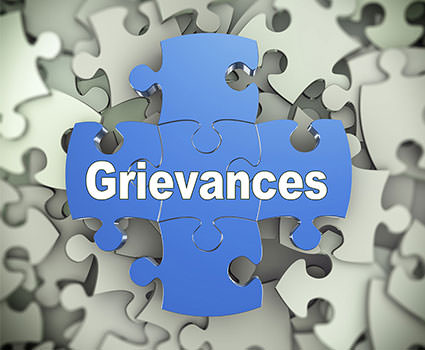Disciplinaries and Grievances
Employers should have clear rules and procedures in place to help them to deal with disciplinary and grievance situations in the workplace.
In fact, employers are obliged to provide details of its disciplinary and grievance procedures to employees within 2 months of their employment starting – see our guide to Employment Contracts / Policies / Staff Handbooks.

The ACAS Code
In April 2009, the ACAS Code of Practice on Disciplinary and Grievance Procedures (‘the Code’) replaced the 3 step statutory disciplinary and grievance procedure. Both employers and employees are expected to follow the new procedures and the Employment Tribunal will take the Code into account when considering claims.
Below is a brief guide, but full details can be found in the latest edition of the ACAS Code, which came into force on 11th March 2015.
The Code is supplemented by a non-statutory ACAS guide, which gives further practical guidance on complying with the Code. While the guide itself does not have to be taken into account by Employment Tribunals, it does contain some useful guidance developed from unfair dismissal case law, and therefore employers should not ignore it.
Penalties for Non-Compliance
If an Employment Tribunal finds that an employer or employee unreasonably failed to comply with the Code, they may adjust an award by up to 25% in favour of either party. Employment Tribunals will consider the size and resources of an employer when making a decision, as it sometimes may not be practicable for all employers to take all the steps set out in the Code.
Basic Principles Of The Disciplinary And Grievance Process
The Code sets out the basic principles of the process:
- Rules and procedures should be set down in writing;
- Disciplinary procedures should give examples of acts the employer regards as gross misconduct (e.g. theft, fraud, violence, etc.);
- Employers and employees should act consistently;
- Employers and employees should raise and deal with issues promptly and without unreasonable delay;
- Employers should carry out the necessary investigations to establish the facts of the case;
- Employees should be informed of the basis of the problem and provided the opportunity to respond;
- Employers should allow employees to be accompanied to any meetings, if they so reasonably request;
- Employers should inform the employee of the outcomes of any such meetings in writing, without undue delay;
- Employees should be allowed the opportunity to appeal against any formal decision made.

The Process
In short, the recommended procedures are as follows:
Disciplinary Procedure
- Employers should carry out reasonable investigations to establish the facts of the case;
- Any period of suspension should be for as brief a period as possible and it should be made clear that this in itself is not to be considered disciplinary action;
- If it is decided that there is a disciplinary case to answer, employees should be notified in writing of the alleged misconduct (with any evidence) and its possible consequences and invited to attend a disciplinary meeting, ensuring that the employee has a reasonable opportunity to consider the allegations and any evidence and prepare their case;
- The employer should hold a disciplinary meeting to explain the allegations to the employee and to hear their responses;
- The employee has a statutory right to bring a companion (a colleague or a trade union representative) to the disciplinary meeting;
- After deciding whether or not disciplinary action (or any other action) is justified, the employer must inform the employee in writing.
- The employee should be informed of their right to appeal the decision.
- Appeals should be dealt with impartially at a meeting, which should (if possible) be conducted by a manager who has not been previously involved;
- Again, the employee has a statutory right to bring a companion (a colleague or a trade union representative) to the appeal meeting;
- The employer should confirm its final decision to the employee in writing.
Grievance Procedure
- The employee should raise the grievance in writing;

- The employer should hold a meeting and investigate the complaint;
- The employee has a statutory right to bring a companion (a colleague or a trade union representative) to the grievance meeting;
- The employer should send a written decision to the employee, including (where appropriate) details of any action it intends to take to resolve the grievance;
- The employee should be informed of their right to appeal the decision;
- Appeals should be dealt with impartially at a meeting, which should (if possible) be conducted by a manager who has not been previously involved;
- Again, the employee has a statutory right to bring a companion (a colleague or a trade union representative) to the appeal meeting;
- The employer should confirm its final decision to the employee in writing.
Overlapping Disciplinary and Grievance Cases
- Where an employee raises a grievance during a disciplinary process, the disciplinary process may be temporarily suspended in order to deal with the grievance.
- Where the grievance and disciplinary cases are related it may be appropriate to deal with both issues concurrently.
Claims And Dismissals Not Included In The Code
The Code does not apply to dismissals by reason of either redundancy (see our separate guide to redundancies) or to the non-renewal of fixed term contracts.
Say Hello
If you need more advice in this area, please call a member of our team.


